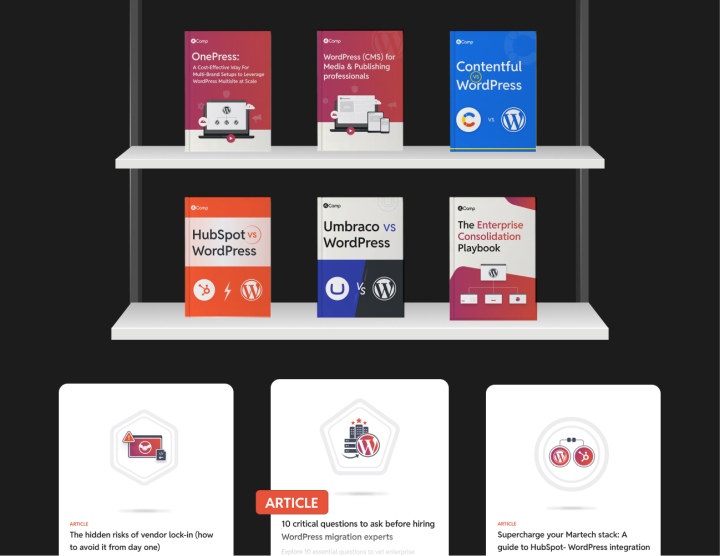HubSpot vs WordPress: The big picture
When you put HubSpot Content Hub and WordPress side by side, the trade-offs are clear, especially for enterprises that need flexibility and scale.
HubSpot’s Content Hub shines at what it’s built for: fast, integrated marketing execution (all within the HubSpot ecosystem). Its landing pages, lead gen tools, and built-in automation help marketing teams launch campaigns quickly with minimal IT overhead. But the moment you need to go beyond its native toolkit, custom workflows, complex integrations, headless architectures, or large-scale multisite needs, you run into real limitations.
Even when you roll in HubSpot’s full ecosystem (CRM, Marketing, Sales, Ops, etc.), it still isn’t a true Digital Experience Platform (DXP) in the enterprise sense. A real DXP means composable freedom: custom content models, best-of-breed integrations, full data ownership, and the ability to plug in any CRM, CDP, or personalization engine you choose. HubSpot does a lot well, but it can’t fully deliver that breadth on its own.
WordPress, by contrast, is exactly this: an open, enterprise-grade CMS that fits into any modern DXP stack. It doesn’t dictate your marketing stack, it empowers it. You decide how your stack needs to be and WordPress simply plugs in as the content layer that you fully control. Pair it with HubSpot’s CRM or marketing tools if that’s best for your teams, and you get the best of both, without hidden costs or vendor lock-in.
HubSpot vs WordPress: Which is the right fit for your stack?
WordPress for content, and HubSpot CMS where it fits best for marketing, sales, and ops with content at the core. So:
- Use WordPress for your content. It wins as the CMS foundation for modern, large-scale, flexible DXP stacks.
- Use HubSpot for what it does best: CRM, inbound marketing, and sales enablement.
Often it’s HubSpot + WordPress…
For many organizations, it’s not WordPress versus HubSpot, it’s WordPress and HubSpot.
When integrated well, they complement each other really well. It’s possible to:
- Sync form submissions from your WordPress site directly into HubSpot’s CRM and workflows.
- Use HubSpot lists and segments to personalize WordPress pages dynamically.
- Maintain full control over your content stack while giving marketing teams the no-code tools they love for to build, send, and track campaigns (contacts collected on WordPress flow into HubSpot automatically).
And much more.
We do such integrations all the time. At rtCamp, HubSpot–WordPress integrations are among the most requested ones. Done well, you get the best of both worlds: the freedom and power of WordPress plus the marketing acceleration of HubSpot.
Next steps
Still have questions around deciding between HubSpot and WordPress?
Reach out for a free consultation. We’ll talk through your stack, your goals, and assess if WordPress, HubSpot, or both together fit your unique digital stack the best.
Already using HubSpot and thinking about moving to WordPress as your enterprise CMS? Check out our CMS migration services. Running WordPress and want to plug in HubSpot’s CRM or marketing automation? Get in touch. We’ll help you plan the right HubSpot–WordPress integrations for your stack, and take it from there.







